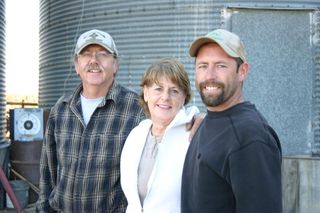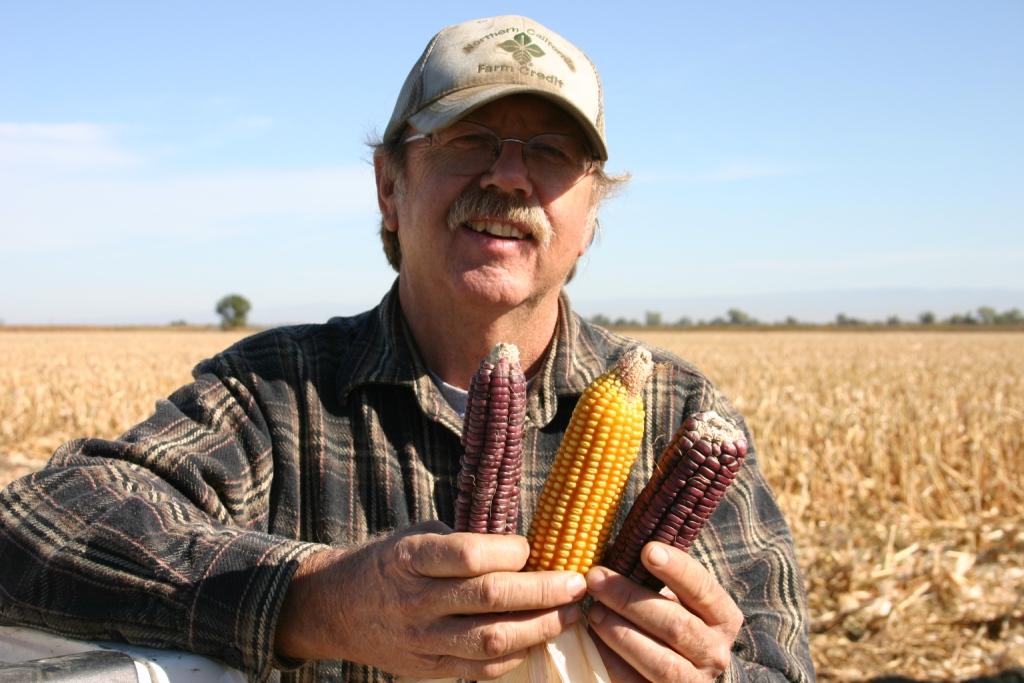
Ask for Leroy Beck on this farm in the Northern California community of Afton and two men will answer. Leroy J. and Leroy D. are father and son. They share a first name, a last name and a long farming tradition.
Both men also participate in the Farm Service Agency Farm Loan program. Leroy D. has a beginning farmer loan and father Leroy J. has a farm operating loan, made possible with funds from the American Recovery and Reinvestment Act.
As Native American borrowers, both father and son are making use of the agency’s low rates and reasonable terms for production farmers needing additional working capital.
I’ve come to consider my friends at the FSA Willows Office as my business partners,” said Leroy J. “We could use a bit more capital right now than is available, but I appreciate this needed investment in our family’s operation.”
Leroy J., his brother Harold and sister Sonja Stipe have owned about 1,200 acres as a family partnership for more than 30 years. Leroy J. and his wife Kathy are leasing about half that ground and have it in various stages of annual agricultural production. This year Leroy J. and Kathy are using FSA loan funds to plant yellow corn, red corn and lima beans. They are also trying 40 acres of rice ground for the first time.
Son Leroy D. also leases from the family partnership. His marketing plan targets an organic niche, growing certified organic bell beans and yellow corn in a 90 acre plot. His corn will play a role in an organic production chain that results in organic milk.
“I sell my organic corn to an organic silage operation in Northern California that supplies feed to organic dairies,” he said.
Although it was more common in the past, there is little dry land farming now in this region. In an average year the Becks are thankful for about 20 inches of rain. They buy a modest amount of irrigation district water and rely mostly on six wells and two tail water recovery pumps running on both diesel and electric power. These days water costs are expensive, but an important element in successful production levels.
 The Becks are California farmers with roots that run deep. According to Harold, the family historian, their great, great grandfather William Beck left Illinois in about 1858 and headed west to California. He first started farming in Modoc County, up north on the Oregon border. Later in the 1880s William purchased land in the community of Princeton, not too far from Afton. There he built a homestead and started ranching.
The Becks are California farmers with roots that run deep. According to Harold, the family historian, their great, great grandfather William Beck left Illinois in about 1858 and headed west to California. He first started farming in Modoc County, up north on the Oregon border. Later in the 1880s William purchased land in the community of Princeton, not too far from Afton. There he built a homestead and started ranching.
Today, Leroy and son are working farm ground in Afton where Glenn, Butte, Colusa and Sutter Counties come together in the middle of the wide-open Sacramento Valley. The property has been in the family since about 1898 when their great grandfather Hulen purchased land there to farm grain.
Harold explains how the Beck and Hulen family lines came together, both with Native American blood in their veins. The setting is 1919 in the rural farming community of Afton. That was when two young Beck brothers fell in love and married two Hulen sisters.
Those Hulen girls had Cherokee and British heritage and were admired by many young men throughout the region as excellent horsewomen. Those Beck boys themselves had a mother with Cherokee blood and a great grandfather who married a full Wintu woman with the blessing of his German father. The rest is California farm history.
One of those two courting couples was Harold and Leroy J.’s grandparents, Edgar Ralph Beck and Estella Bell Hulen. Theirs was an interesting courtship according to Harold.
“In addition to having varied heritage between the families, the Becks ran cattle with a few hogs and the Hulens ran sheep,” said Harold. “As many will understand, those two camps of the early western livestock trade didn’t always see eye-to-eye.”
Harold Beck grew up farming like his brother and is an active member in the family partnership that owns the Beck Farm property. Harold continues the Cherokee and Wintu tribal traditions, having been chosen to share his grandparents’ stories and heritage. He is a U.S. Army veteran who served in Korea and now operates the successful Carb Shop in Yuba City.
Harold and Leroy J. remember their grandparents’ stories about the rugged early farm life at the end of the 1800s in this beautiful valley when family worked mule teams to plow and harvest their 300 acres of grain. Back then a good year yielded about 36 bushels.
Diversification also is a strategy for the Becks. The family partnership has entered into several conservation agreements with the California Wildlife Conservation Board, the California Department of Fish and Game, USDA’s Natural Resources Conservation Service and the California Waterfowl Association. The Becks pledged to preserve and maintain springtime ponds that are mating grounds for migrating waterfowl and valley wildlife. These conservation agreements help to preserve sensitive habitat and in return, the Becks are able to improve their ground and further develop their irrigation wells.
After six generations of farming, the Becks are in it for keeps. It may even be safe to say that this family has been in California long before the Beck boys courted the Hulen girls. According to tribal authorities, the Wintu once numbered over 12,000 proud in Northern California. This exemplifies one facet of the multi-cultural heritage of farming in America.
Ask for Leroy Beck on this farm in the Northern California community of Afton and two men will answer. Leroy J. and Leroy D. are father and son. They share a first name, a last name and a long farming tradition.
Both men also participate in the Farm Service Agency Farm Loan program. Leroy D. has a beginning farmer loan and father Leroy J. has a farm operating loan, made possible with funds from the American Recovery and Reinvestment Act.
As Native American borrowers, both father and son are making use of the agency’s low rates and reasonable terms for production farmers needing additional working capital.
I’ve come to consider my friends at the FSA Willows Office as my business partners,” said Leroy J. “We could use a bit more capital right now than is available, but I appreciate this needed investment in our family’s operation.”
Leroy J., his brother Harold and sister Sonja Stipe have owned about 1,200 acres as a family partnership for more than 30 years. Leroy J. and his wife Kathy are leasing about half that ground and have it in various stages of annual agricultural production. This year Leroy J. and Kathy are using FSA loan funds to plant yellow corn, red corn and lima beans. They are also trying 40 acres of rice ground for the first time.
Son Leroy D. also leases from the family partnership. His marketing plan targets an organic niche, growing certified organic bell beans and yellow corn in a 90 acre plot. His corn will play a role in an organic production chain that results in organic milk.
“I sell my organic corn to an organic silage operation in Northern California that supplies feed to organic dairies,” he said.
Although it was more common in the past, there is little dry land farming now in this region. In an average year the Becks are thankful for about 20 inches of rain. They buy a modest amount of irrigation district water and rely mostly on six wells and two tail water recovery pumps running on both diesel and electric power. These days water costs are expensive, but an important element in successful production levels.
The Becks are California farmers with roots that run deep. According to Harold, the family historian, their great, great grandfather William Beck left Illinois in about 1858 and headed west to California. He first started farming in Modoc County, up north on the Oregon border. Later in the 1880s William purchased land in the community of Princeton, not too far from Afton. There he built a homestead and started ranching.
Today, Leroy and son are working farm ground in Afton where Glenn, Butte, Colusa and Sutter Counties come together in the middle of the wide-open Sacramento Valley. The property has been in the family since about 1898 when their great grandfather Hulen purchased land there to farm grain.
Harold explains how the Beck and Hulen family lines came together, both with Native American blood in their veins. The setting is 1919 in the rural farming community of Afton. That was when two young Beck brothers fell in love and married two Hulen sisters.
Those Hulen girls had Cherokee and British heritage and were admired by many young men throughout the region as excellent horsewomen. Those Beck boys themselves had a mother with Cherokee blood and a great grandfather who married a full Wintu woman with the blessing of his German father. The rest is California farm history.
One of those two courting couples was Harold and Leroy J.’s grandparents, Edgar Ralph Beck and Estella Bell Hulen. Theirs was an interesting courtship according to Harold.
“In addition to having varied heritage between the families, the Becks ran cattle with a few hogs and the Hulens ran sheep,” said Harold. “As many will understand, those two camps of the early western livestock trade didn’t always see eye-to-eye.”
Harold Beck grew up farming like his brother and is an active member in the family partnership that owns the Beck Farm property. Harold continues the Cherokee and Wintu tribal traditions, having been chosen to share his grandparents’ stories and heritage. He is a U.S. Army veteran who served in Korea and now operates the successful Carb Shop in Yuba City.
Harold and Leroy J. remember their grandparents’ stories about the rugged early farm life at the end of the 1800s in this beautiful valley when family worked mule teams to plow and harvest their 300 acres of grain. Back then a good year yielded about 36 bushels.
Diversification also is a strategy for the Becks. The family partnership has entered into several conservation agreements with the California Wildlife Conservation Board, the California Department of Fish and Game, USDA’s Natural Resources Conservation Service and the California Waterfowl Association. The Becks pledged to preserve and maintain springtime ponds that are mating grounds for migrating waterfowl and valley wildlife. These conservation agreements help to preserve sensitive habitat and in return, the Becks are able to improve their ground and further develop their irrigation wells.
After six generations of farming, the Becks are in it for keeps. It may even be safe to say that this family has been in California long before the Beck boys courted the Hulen girls. According to tribal authorities, the Wintu once numbered over 12,000 proud in Northern California. This exemplifies one facet of the multi-cultural heritage of farming in America.
—by Paul Lehman, FSA West Region Public Affairs Officer





